The Lancet has become a laughing stock
The Lancet has become a laughing stock
In summary:
On 6 May 2021 The Lancet published a blatantly flawed study of the effectiveness of the Pfizer covid vaccine on the population of Israel, claiming it was 95% effective.
On 17 May 2021 we submitted a rapid response 250 word letter explaining why the study was flawed.
After an initial response saying they would ask the authors for a response to our letter we heard nothing until 20 months later.
On 8 January 2023 we got an email out of the blue from The Lancet Senior Editor Josefine Gibson apologising for never having got back to us about the letter, saying that they had asked the lead author Dr Sharon Alroy-Preis (SA-P) to respond to our letter but, because she did not provide any formal response, they have decided not to publish our letter.
We tweeted The Lancet's response and within 24 hours it got over one million impressions. We also published a substack article highlighting the fact we were now aware of additional problems with the paper relating to SA-P’s relationship with Pfizer.
On 10 January 2023 we got an unsolicited email from Josefine Gibson (which we can only assume was a result of the reputation hit they got from our tweet) saying “Thank you for bringing your letter from May 2021 back to our attention. We are looking into next steps and will get back to you as soon as we can.”
On 11 January 2023 (at 10:58) we sent an email to The Lancet's Editor-in-Chief Richard Horton directing him to our substack article (which highlighted these new problems relating to SA-P's relationship with Pfizer) stating that The Lancet was clearly taking a credibility hit surrounding the publication of the Israel-Pfizer study and its response to criticisms of it.
On 11 January 2023 (at 11:21) we got an email from Josefine Gibson apologising for the ‘sub standard experience’ we had with The Lancet. She said that, after discussing it with Horton, they were now inviting us to publish the original letter or an update to it, suggesting the update ‘reflect more current experience with the vaccine’.
On 12 January 2023 we submitted our updated letter (of an agreed 350 words).
On 13 January 2023 we got a response from Josefine Gibson saying they had decided against publishing the letter.
Here is the full narrative and January 2023 correspondence in date order (personal details redacted):
The ‘out of the blue’ email from The Lancet on 8 Jan (20 months after we submitted our original letter which can be read in this substack article):
The tweet on 6 Jan after receiving the email:
Our substack article on 10 Jan highlighting the new issues relating to lead author Sharon Alroy-Preis (SA-P):
The email from Josefine Gibson on 10 Jan (curious and ‘unsolicited’ because we had not responded to The Lancet's ‘rejection’ on 8 January):
The email sent to Richard Horton on 11 Jan at 10:58:
The response we got from Josefine Gibson on 11 Jan at 11:21:
7. Our response:
Lancet agreement to a 350-word new letter with limit of 5 references:
Our letter submitted on 12 Jan (349 words):
Misleading Claims in study of Pfizer vaccine effectiveness
Norman Fenton and Martin Neil, 12 Jan 2023
An article about Israel’s experience with the Pfizer covid-19 vaccine was published in The Lancet in May 2021, [1]. We wrote a response letter, [2], explaining why its claim of 95% effectiveness was exaggerated, pointing out that the study failed to adjust for a declining infection rate, and for the very different testing protocols applied to vaccinated versus unvaccinated people. The study also ignored all covid cases reported for people who had received either just a single or a second dose less than seven days previously; such people were not considered ‘fully vaccinated’, inevitably leading to an exaggeration of vaccine effectiveness [3].
These concerns expressed 20 months ago, have been borne out by data confirming how exaggerated the effectiveness claim was.
The Lancet sent our letter to the lead author of the study, Sharon Alroy-Preis (SA-P), for comment but she did not respond to the criticisms, so the Lancet did not publish it.
We have further concerns about the integrity of the article. SA-P was not among the 8 of 15 authors who declared holding share and stock options in Pfizer; she also declared no conflict of interest. Yet, she is Head of Public Health Services at the Israeli Ministry of Health (IMOH) during the period when Israel became the ‘laboratory for Pfizer’ [4]. The relationship between Pfizer and the IMOH (starting 6 Jan 2021, four months before the Lancet article was published) is laid out in their collaboration agreement [5] which makes clear results cannot be made public without both parties’ approval, and names SA-P as the IMOH appointee responsible for managing this relationship with Pfizer.
The Lancet article provided no information about the vaccine’s adverse reactions which we now know are substantial. In her presentation to the FDA expert committee about the booster, SA-P claimed Israel monitors safety closely, whereas we now know they did not have a functioning system until the end of 2021 [4].
Hence, we feel that the paper’s findings – which led many to believe the Pfizer vaccine was extremely safe and effective - are severely compromised and that the article should be retracted.
References
[1] Haas et al: “Impact and effectiveness of mRNA BNT162b2 vaccine against SARS-CoV-2 infections and COVID-19 cases, hospitalisations, and deaths following a nationwide vaccination campaign in Israel: an observational study using national surveillance data” https://doi.org/10.1016/S0140-6736(21)00947-8
[2] Fenton NE and Neil M “Is the Pfizer vaccine as effective as claimed?”, 17 May 2021. https://wherearethenumbers.substack.com/important-caveats-to-pfizer-vaccine
[3] Neil M, Fenton N, Smalley J., Craig C., Guetzkow J., McLachlan S., Rose, J. Latest statistics on England mortality data suggest systematic mis-categorisation of vaccine status and uncertain effectiveness of Covid-19 vaccination, December 2021. http://dx.doi.org/10.13140/RG.2.2.14176.20483
[4] Fenton NE and Neil M, “The curious case of Dr Sharon Alroy-Preis and the claims of safety and effectiveness of the Pfizer vaccine”.
https://wherearethenumbers.substack.com/p/alroy-preis
[5] Real-world epidemiological evidence collaboration agreement between the Israeli Ministry of Health, acting on behalf of the State of Israel and Pfizer Inc, 6 Jan 2021. https://govextra.gov.il/media/30806/11221-moh-pfizer-collaboration-agreement-redacted.pdf
The Lancet's rejection of the letter, they invited, on 13 January:
So, there you have it. We are dubbed misinformation spreaders because The Lancet have unique access to the truth, and furthermore the integrity of the Israeli trial data is placed beyond question even though the Israeli public health apparatchik, SA-P, who is supposed to be independent of corporate interests, is legally bound to publish results approved by Pfizer.
Of course, our experience is just one of many cases of corruption by The Lancet.
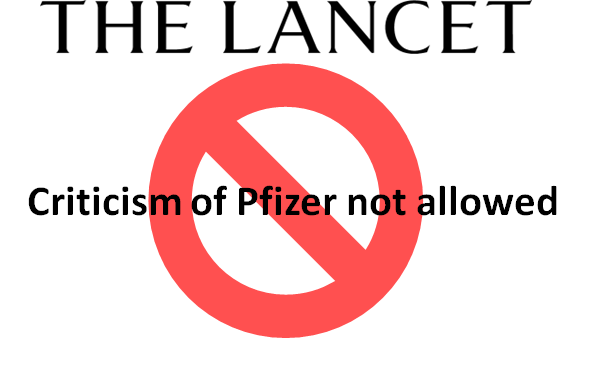
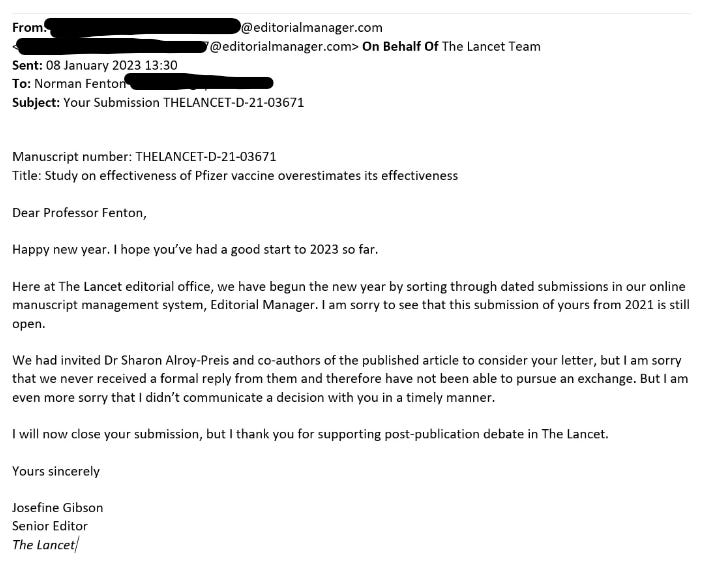
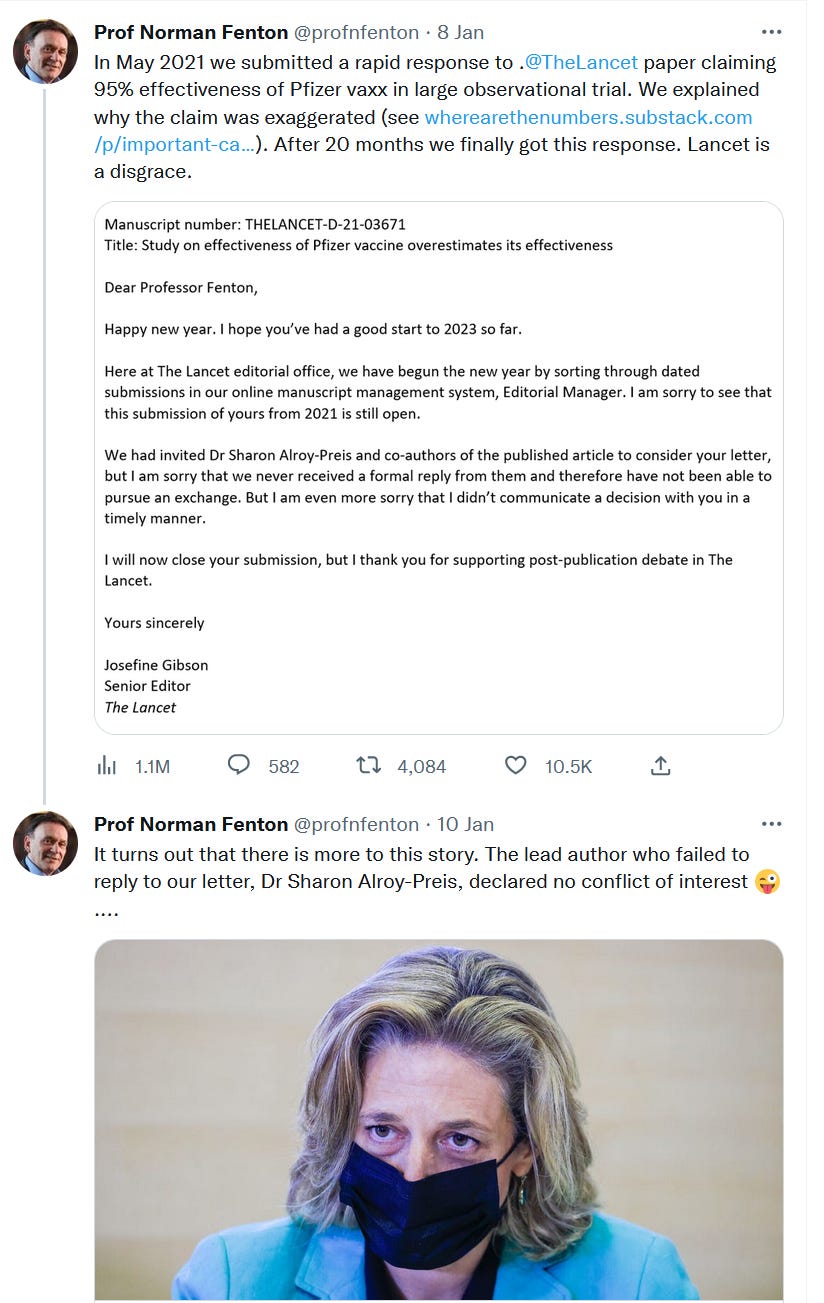


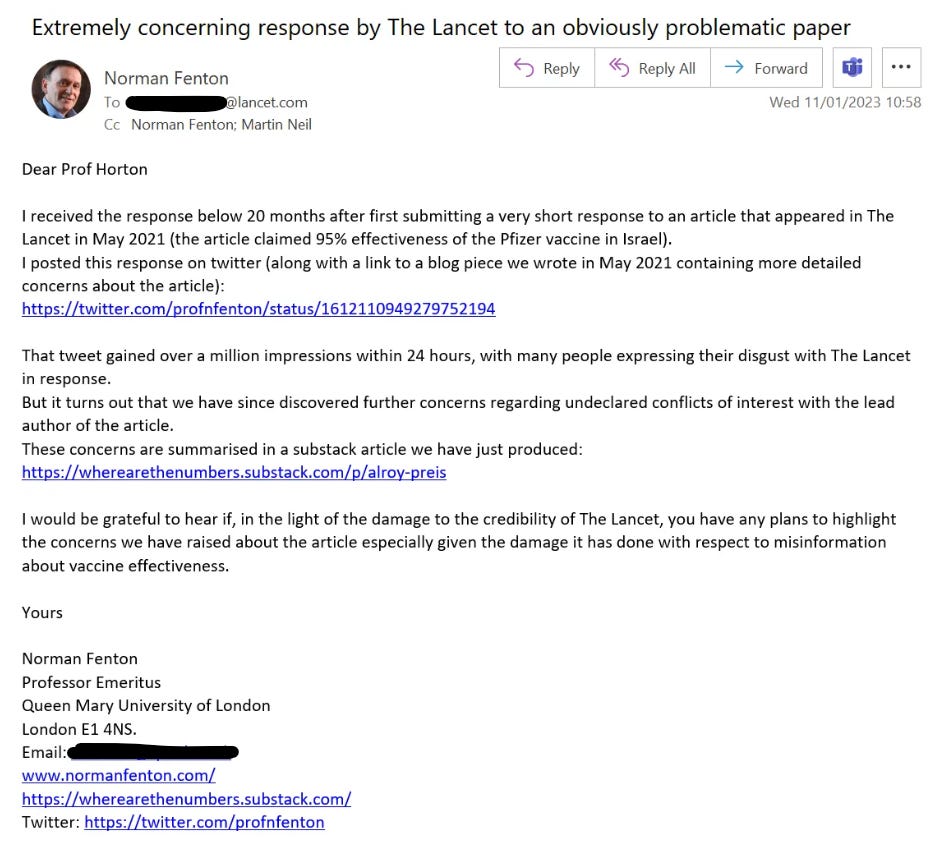
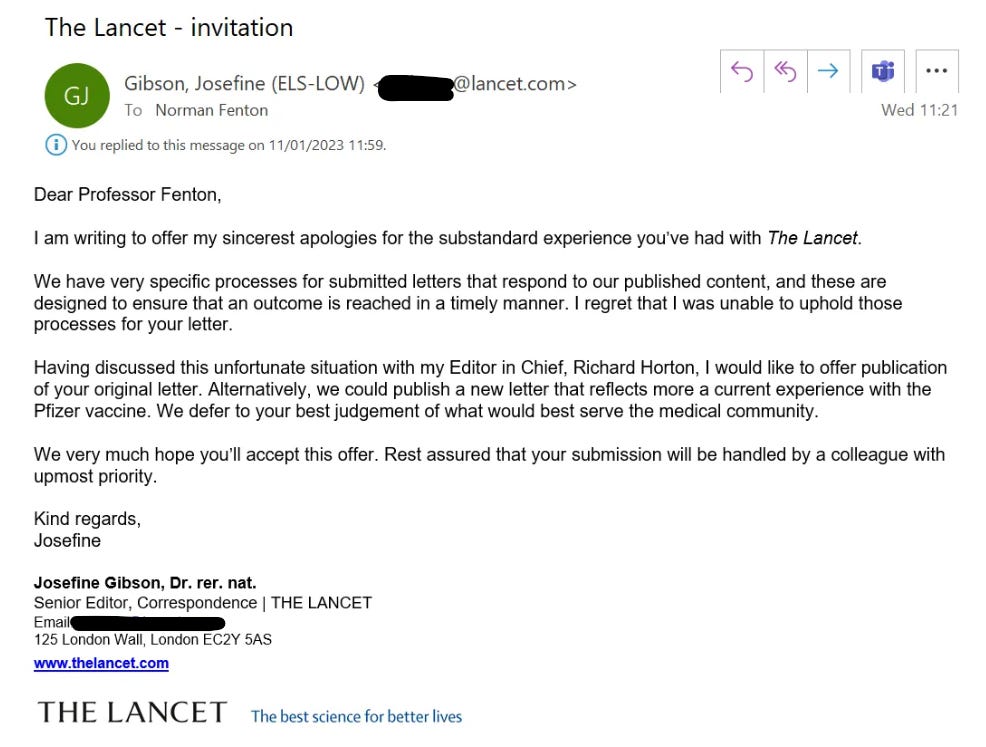
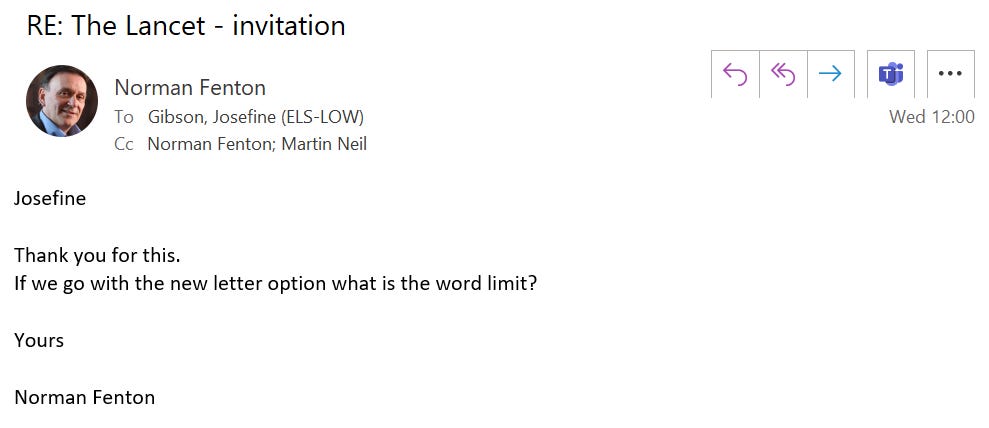
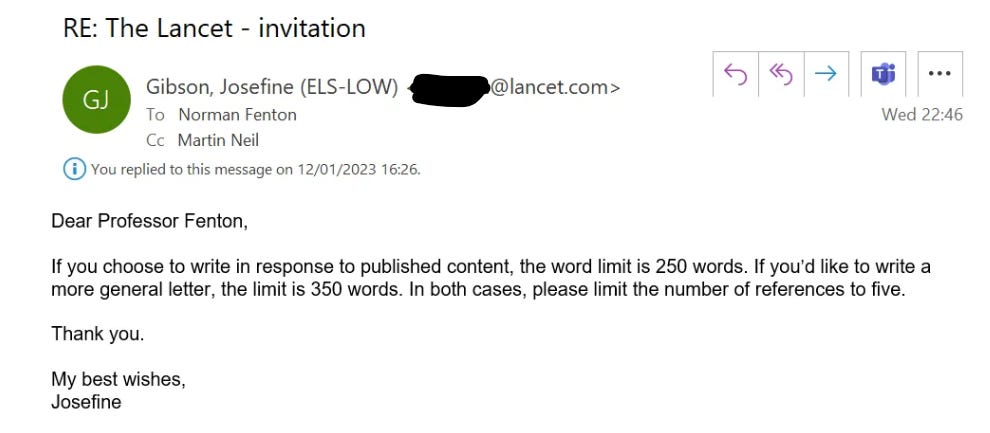
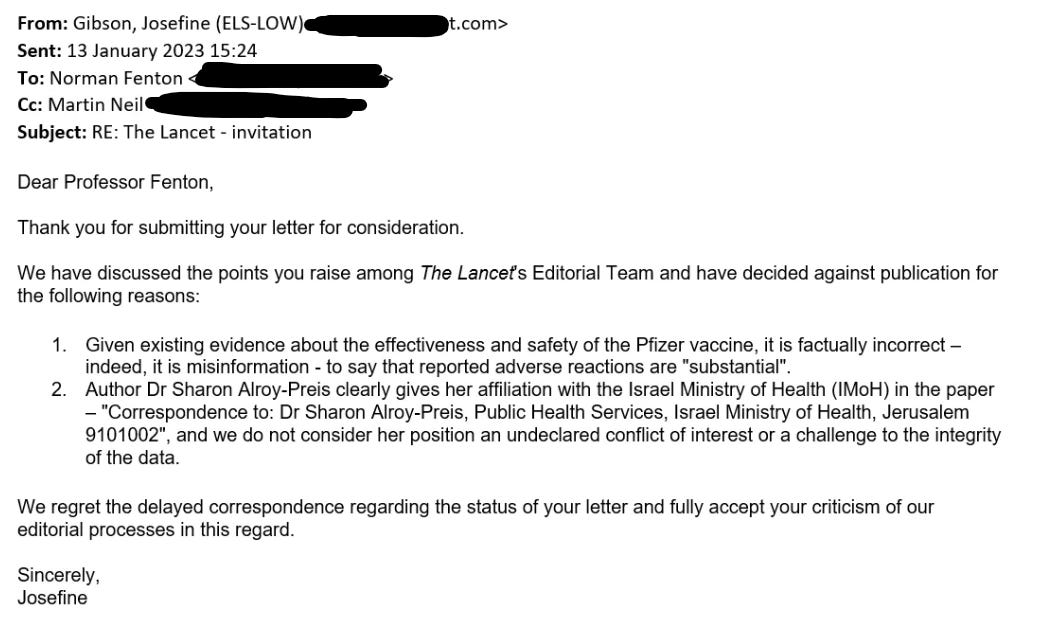
Comments
Post a Comment